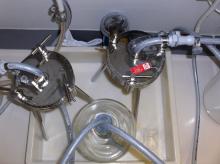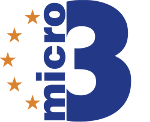- Home
- About
- OSD
- MyOSD
- Partners
- Work Packages
- WP 1Management & Coordination
- WP 2 (OSD)Ocean Sampling Day
- WP 3Oceanography & Environmental Data
- WP 4Standards and Interoperability
- WP 5Bioinformatics & Data Integration
- WP 6Exploring Ecosystems Biology
- WP 7Function and Biotechnology
- WP 8Intellectual Property (IP) Management for Marine Bioprospecting
- WP 9Dissemination & Outreach
- Public DeliverablesAll Micro B3's public deliverables
- Meetings
- Workshops
- Third Micro B3 Industry Expert Workshop
- Micro B3 Industry Expert Workshop
- Micro B3/OSD Analysis Workshop
- Micro B3 Stakeholder Workshop
- Micro B3 Summer School in Crete 2014
- Marine Metagenomics Bioinformatics
- Micro B3 Industry expert workshop
- EU-US Training 2013
- Micro B3 Statistics Training 2013
- MG4U Bioinformatics Training 2013
- Bioinformatics Training 2012
- EU-US Training 2012
Standards and Interoperability
Rationale and objectives
 The objective of workpackage 4 (WP 4) is to develop structures and standards for marine microbial sampling allowing consistent descriptions of sampling sites, sampling methodology, sample characteristics, sample and data storage and processing as well as molecular analysis methodology. Developed interoperability structures will support dissemination of the data to the scientific community for a long-term utility and facilitate implementation of the integrated view of marine microbial diversity.
The objective of workpackage 4 (WP 4) is to develop structures and standards for marine microbial sampling allowing consistent descriptions of sampling sites, sampling methodology, sample characteristics, sample and data storage and processing as well as molecular analysis methodology. Developed interoperability structures will support dissemination of the data to the scientific community for a long-term utility and facilitate implementation of the integrated view of marine microbial diversity.
 The pragmatic approach chosen to support data flow and usability is drawing extensively on established standardisation methodologies developed by the Genomics Standards Consortium, data standardisation efforts of National Oceanographic Data Centres and expertise of the pan-European infrastructure for ocean and marine data management - the SeaDataNet.
The pragmatic approach chosen to support data flow and usability is drawing extensively on established standardisation methodologies developed by the Genomics Standards Consortium, data standardisation efforts of National Oceanographic Data Centres and expertise of the pan-European infrastructure for ocean and marine data management - the SeaDataNet.
Work in WP 4 is supporting not only the OSD in June 2014 but also similar marine microbial sampling enterprises, in particular the Tara Oceans expeditions. Team work with WP 3 and 5 members leads to interoperable and meaningful datasets which will be made available to molecular microbial researchers as well as to the oceanographic community.
Recent progress
The WP 4 team is coordinating development of best practice guidelines on marine sample collection, logistics and bioinformatics for marine sampling stations and cruises. Micro B3 Standard Operating Procedures and Reporting Standards were agreed by experts across oceanographic, biodiversity and molecular domains. This allows Micro B3 data to be collected in an orchestrated way and consistently with national and international legal commitments in the countries involved. Recently the WP 4 team produced the Ocean Sampling Day Handbook, version 2.0.
Micro B3 is at the core of merging standards from genomic, biodiversity and oceanography domains.
EMBL-EBI organised two workshops in the first half of 2012. Outcomes of both workshops contributed to development of Micro B3 standards concepts.
- On 19 - 20 April 2012 the Micro B3 Standards and Interoperability Use Case Workshop was held. It identified and described use case studies in marine ecosystem biology that provided hypothesis-driven insights into marine microbial sampling. Participants from six institutes analyzed and discussed prototype use cases in marine ecosystem biology, particularly diatom biology, and their legal interpretation. The goal was to develop use cases that will identify questions to be asked of the sampled marine microbial systems. More details on this workshop could be found in the use case workshop and e-conference report (D4.1).
- On 5 - 6 July 2012 the Micro B3-WP 4 Sampling Groups Workshop was held. It provides an overview of current marine sampling practices. Participants from thirteen European institutes discussed current and best practices in marine sampling. More details on this workshop could be found in the best practices and e-conference report (D4.2).
Recently the WP 4, team in conjunction with other work packages, produced the Ocean Sampling Day Handbook (D4.3, version 2.0) based on the outcomes of the two workshops. This is a best practice guide describing procedures and policies on the marine sample collection, logistics and bioinformatics. It is aimed primarily at marine research stations and cruises contributing to the main sampling event of the Micro B3 project, the Ocean Sampling Day 2014. It includes a comprehensive description of standard reporting requirements in oceanographic, biodiversity and molecular domains. Also care has been taken to ensure it is consistent with national and international jurisdictions’ practices.
Lead of WP 4: Guy Cochrane, European Bioinformatics Institute
Suggested further reading:
The future of DNA sequence archiving, Cochrane et al., 2012, published in GigaScience, the new integrated database and journal.
http://www.gigasciencejournal.com/content/1/1/2



